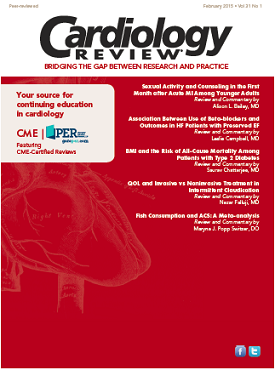Flu Vaccines May Reduce Heart Failure Risks
“The reason we are talking about vaccinations is that they are some of the simplest interventions we can provide our patients to reduce heart failure (HF) hospitalizations and HF exacerbations,†says Dr. Orly Vardeny, PharmD.
“The reason we are talking about vaccinations is that they are some of the simplest interventions we can provide our patients to reduce heart failure (HF) hospitalizations and HF exacerbations,” says Dr. Orly Vardeny, PharmD, at the beginning of her presentation on analysis of influenza and pneumococcal vaccinations as related to cardiovascular disease.
She pointed out that influenza causes approximately 36,000 deaths per flu season and greater than 200,000 influenza-associated hospitalizations. Moreover, many cardiologists attending the 2016 Heart Failure Society of America meeting have treated influenza patients that developed acute decompensated HF. Analysis of influenza reveals an approximate 3-to-5-fold increase in risk of acute cardiovascular events or stroke following infection.
Dr. Vardeny also described a more recent meta-analysis of patients that revealed that the use of influenza vaccine was associated with a lower risk of major adverse cardiovascular events.
Everyone above the age of 6 months should be vaccinated, including pregnant women, according to the CDC recommendations. Contrary to previous beliefs, timing is such that vaccination should be done as soon as possible. There is no preferred season for vaccination. Several types of vaccines are available, including an intradermal formulation for the needle averse and a higher dosage formulation for >65y. Data from as early as 1979 clearly shows a direct correlation between antibody titer and decreased infection: a titer less than 10 results in approximately 74% infection, while only 4% infection for titers ≥160.
Recent randomized trials performed with over 36,000 subjects >65 years of age compared a standard dose to a double dose (high dose). A clear statistically significant reduction in influenza, pneumonia, and cardiorespiratory illness was observed. Approximately 3% of vaccinated patients had cardiorespiratory illness, while 5% had cardiorespiratory illness with the unvaccinated. The safety profile was generally well tolerated, with no differences for all serious adverse events.
Today, they are doing a randomized trial in post-MI or post-HF hospitalization patients that compares trivalent high dose vaccine to standard quadrivalent dose to determine whether this affects cardiorespiratory illness. It will take about four flu seasons to reach a conclusion.
Next, Dr. Vardeny elaborated on pneumococcal vaccinations. She often hears this described as the “pneumonia vaccination,” but this is a misnomer because pneumococcus also causes meningitis and more. So the vaccine is useful for much more than a “pneumonia vaccination.” Pneumococcus is a significant cause of hospitalizations and morbidity, where the major issue is drug resistance. Drug resistance causes an increase of approximately 30% of the cases and it is especially high amongst older adults.
Most relevant, data from a systematic review has revealed an increased risk of developing community acquired pneumonia or acute coronary syndrome in patients with HF. Dr. Vardeny highlighted data indicating that pneumococcal polysaccharide vaccine has been shown to reduce cardiovascular events as compared similar cohorts that were not vaccinated.
Pneumococcal vaccinations are recommended by CDC in all patients >65 years or those 19 to 64 years with certain chronic conditions - smokers, nursing home, HF, asthma. Details regarding which vaccine is recommended were reviewed and are available through the CDC.
Dr. Vardeny summarized that influenza and pneumococcal infections lead to significant cardiovascular disease morbidity and that vaccines are a simple and straightforward intervention for preventing HF hospitalizations. Moreover, based on active trials, they will soon know whether certain formulations should be used more frequently even in patients under the age of 65 that are at high risk for cardiovascular conditions.
Related Coverage:
Real-World Challenges to Prescribing Sacubitril/Valsartan for Patients with Heart Failure
Improving Care in Heart Failure
Decrease in Fatal Strokes Related to Decrease in Smoking Rates?
